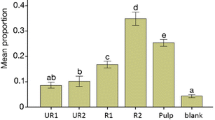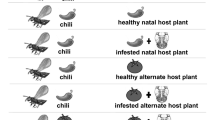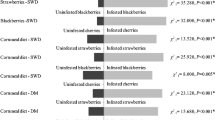Abstract
We show that blueberry maggot females [Rhagoletis mendax(Curran)], apple maggot females [Rhagoletis pomonella(Walsh)], and walnut husk fly females [Rhagoletis suavis(Loew)], all relative specialists in range of fruit species attacked in nature, are able to learn to discriminate between types of fruit in which they oviposit. It appears, however, that these relative specialists express less capacity to learn fruit characters than relative generalist tephritids. This difference in expression of learning ability may be associated in part with differences in assignments species are asked to learn. Apparent differences in learning capability between relative specialist and relative generalist tephritids may therefore depend as much upon differences in the physical and chemical nature of host fruit as upon species differences in the adaptive value of learning.
Similar content being viewed by others
References
Bernays, E. A., and Graham, M. (1988). On the evolution of host specificity in phytophagous arthropods.Ecology 69: 886–892.
Bierbaum, T. J., and Bush, G. L. (1988). Divergence in key host examining and acceptance behaviors of the sibling speciesRhagoletis mendax andR. pomonella. In Aliniazee, M. T. (ed.), Ecology and Management of Economically Important Fruit Flies.Ore. State Univ. Agr. Exp. Sta. Special Rep. 830: 26–55.
Bush, G. L. (1966). The taxonomy, cytology and evolution of the genusRhagoletis in North America.Bull. Mus. Comp. Zool. Harvard Univ. 134: 431–562.
Coli, W. M., Prokopy, R. J., and Leahy, K. (1986). The walnut husk fly: A “new” pest of peaches in Massachusetts.Mass. Fruit Notes 51 (3): 1–4.
Cooley, S. S., Prokopy, R. J., McDonald, P. T., and Wong, T. T. Y. (1986). Learning in oviposition site selection byCeratitis capitata flies.Entomol. Exp. Appl. 40: 47–51.
Dean, R. W. (1969). Infestation of peaches byRhagoletis suavis.J. Econ. Entomol. 62: 940–941.
Diehl, S. R., and Prokopy, R. J. (1986). Host selection behavior differences between the fruit fly sibling speciesRhagoletis pomonella andR. mendax.Ann. Entomol. Soc. Am. 79: 266–271.
Fox, L. R., and Morrow, P. A. (1981). Specialization: species property or local phenomenon?Science 211: 887–893.
Greenberg, R. (1985). A comparison of foliage discrimination learning in a specialist and a generalist species of migrant wood warbler.Can. J. Zool. 63: 773–776.
Laverty, T., and Plowright, R. C. (1988). Flower handling by bumblebees: A comparison of specialists and generalists.Anim. Behav. 36: 733–740.
Papaj, D. R. (1986). Interpopulation differences in host preference and the evolution of learning in the butterflyBattus philenor.Evolution 40: 518–530.
Papaj, D. R., and Prokopy, R. J. (1986). Phytochemical basis of learning inRhagoletis pomonella and other herbivorous insects.J. Chem. Ecol. 12: 1125–1143.
Papaj, D. R., and Prokopy, R. J. (1988). The effect of prior adult experience on components of habitat preference in the apple maggot fly (Rhagoletis pomonella).Oecologia 76: 538–543.
Papaj, D. R., and Prokopy, R. J. (1989). Ecological and evolutionary aspects of learning in phytophagous insects.Annu. Rev. Entomol. 34: 315–350.
Papaj, D. R., Prokopy, R. J., McDonald, P. T., and Wong, T. T. Y. (1987). Differences in learning between wild and laboratoryCeratitis capitata flies.Entomol. Exp. Appl. 45: 65–72.
Papaj, D. R., Opp, S. B., Prokopy, R. J., and Wong, T. T. Y. (1989). Cross induction of fruit acceptance by the medflyCeratitis capitata: The role of fruit size and chemistry.J. Insect Behav. 2: 241–254.
Prokopy, R. J., and Berlocher, S. H. (1980). Establishment ofRhagoletis pomonella on rose hips in southern New England.Can. Entomol. 112: 1319–1320.
Prokopy, R. J., and Fletcher, B. S. (1987). The role of adult learning in the acceptance of host fruit for egglaying by the Queensland fruit fly,Dacus tryoni.Entomol. Exp. Appl. 45: 259–263.
Prokopy, R. J., and Papaj, D. R. (1988). Learning of apple fruit biotypes by apple maggot flies.J. Insect Behav. 1: 67–74.
Prokopy, R. J., Averill, A. L., Cooley, S. S., and Roitberg, C. A. (1982). Associative learning in egglaying site selection by apple maggot flies.Science 218: 76–77.
Prokopy, R. J., Green, T. A., and Vargas, R. I. (1990).Dacus dorsalis flies can learn to find and accept host fruit.J. Insect Behav. 3: 663–672.
Vet, L. E. M., Lewis, W. J., Papaj, D. R., and van Lenteren, J.C. (1990). A variable-response model for parasitoid learning behavior.J. Insect Behav. 3: 471–490.
Via, S. (1990). Ecological genetics and host adaptation in herbivorous insects.Annu. Rev. Entomol. 35: 421–446.
Author information
Authors and Affiliations
Rights and permissions
About this article
Cite this article
Prokopy, R.J., Cooley, S.S. & Papaj, D.R. How well can relative specialistRhagoletis flies learn to discriminate fruit for oviposition?. J Insect Behav 6, 167–176 (1993). https://doi.org/10.1007/BF01051502
Accepted:
Issue Date:
DOI: https://doi.org/10.1007/BF01051502




